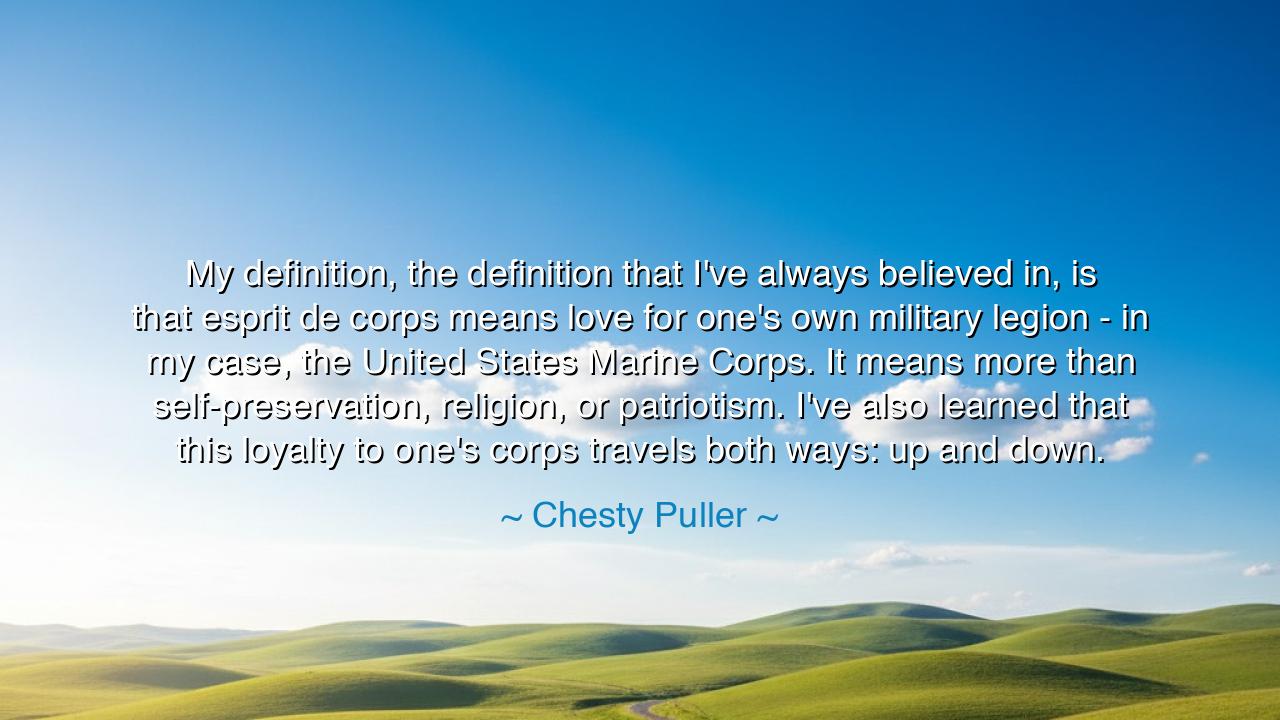
My definition, the definition that I've always believed in, is
My definition, the definition that I've always believed in, is that esprit de corps means love for one's own military legion - in my case, the United States Marine Corps. It means more than self-preservation, religion, or patriotism. I've also learned that this loyalty to one's corps travels both ways: up and down.






“My definition, the definition that I’ve always believed in, is that esprit de corps means love for one’s own military legion — in my case, the United States Marine Corps. It means more than self-preservation, religion, or patriotism. I’ve also learned that this loyalty to one’s corps travels both ways: up and down.” Thus spoke Lewis “Chesty” Puller, the most decorated Marine in American history, a man forged in the crucible of war and brotherhood. His words are not merely about soldiers or battlefields — they speak to the deepest truths of loyalty, unity, and love born of shared purpose. For in every age, whether among warriors, builders, or dreamers, there is no force more sacred than the bond between those who stand side by side in the face of danger, trusting one another with their very lives.
Chesty Puller, whose name is legend among Marines, served through five major conflicts — Nicaragua, Haiti, World War II, and Korea — and embodied the heart of the Corps: courage, endurance, and devotion to his men. His definition of esprit de corps — literally “the spirit of the body” — transcends mere discipline or obedience. It is love, he says, and love of the purest kind — love that puts the good of the group above one’s own survival. To Puller, this spirit was stronger than fear, religion, or even patriotism itself, for it was the living heartbeat of the Corps — the fire that kept men standing when all else had failed.
When Puller speaks of love for one’s legion, he touches upon a truth known to soldiers since the dawn of history. The Spartans of Thermopylae stood not for glory, but for one another; the Roman legions marched not for conquest alone, but for the honor of their comrades. This love is not sentimental — it is discipline born of devotion, a faith in one’s brothers and leaders that transforms ordinary men into something unbreakable. And Puller, who led from the front, who slept in the same mud as his Marines, understood that such love cannot be commanded — it must be earned.
He adds, “This loyalty to one’s corps travels both ways: up and down.” In those few words lies the essence of leadership. True loyalty is not a one-way chain of command; it flows like blood through the body — from the general to the private, from the commander to the lowest man in the line. Puller himself lived this creed. During the bitter cold of the Korean War at the Chosin Reservoir, when his Marines were surrounded by enemy forces, he refused to retreat or abandon his men. Instead, he said with iron calm, “We’re not retreating, we’re just advancing in a different direction.” His courage gave strength to the weary, and his faith in them gave them faith in themselves. This is what it means for loyalty to travel both ways: a leader who serves as fiercely as he commands, and followers who would stand beside him to the last.
Puller’s vision of esprit de corps also reveals a profound spiritual truth. Though born of war, it mirrors what every society, every community, every family needs to survive — shared love and mutual duty. It is the same spirit that binds sailors at sea, healers in a hospital, or even citizens in a just nation. Where self-interest divides, esprit de corps unites. Where fear weakens, love fortifies. It transforms a group of individuals into a living, breathing whole. And in that unity lies a power far greater than any weapon — the power of sacrifice and trust.
History remembers Chesty Puller not only for his victories, but for his devotion to his Marines. Once, when he saw a young soldier shivering in the cold, he took off his own gloves and gave them away. When asked why, he simply said, “He needed them more than I did.” That small act speaks more loudly than medals or ranks. For in every act of service — from a leader to his men, or a man to his leader — the spirit of the Corps is renewed. It is not born in glory, but in shared hardship and compassion.
So, my child, learn from this warrior’s creed. Whatever your calling — whether in battle, in work, or in the quiet struggles of life — remember that no victory is won alone. Cultivate your own esprit de corps — love your comrades, your team, your family — not with words, but with steadfast action. Be loyal upward and downward; lead with courage, follow with honor. For when love and loyalty flow in both directions, even the weakest among you becomes strong, and even the darkest hour cannot break you.
In the end, Chesty Puller’s words remind us that greatness is not found in conquest or command, but in devotion to something greater than the self. The highest form of worship, the noblest kind of courage, is love — the kind that stands its ground when the world trembles. To live with such spirit is to walk the ancient path of all who have ever served a cause beyond themselves. And when you do, you too will know the sacred truth of Puller’s words: that the bond of true brotherhood — the esprit de corps — is stronger than fear, deeper than death, and eternal as the soul itself.






AAdministratorAdministrator
Welcome, honored guests. Please leave a comment, we will respond soon